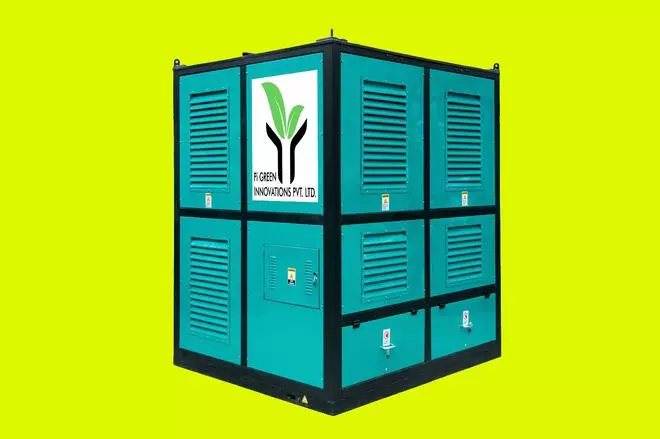Conventional air purifiers rely on a filter, which, however, degrades over time, loses efficiency and creates additional waste, points out Rizwan Shaikh, co-founder of Pi Green Innovation.
It was this disadvantage that spurred Shaikh, who earlier ran an air-conditioner repair shop, to work on developing an alternative solution. Pi Green Innovation’s Co-founder Irfan Pathan describes the challenge they set out to tackle: “We knew that solving air pollution with filters was not sustainable as they require frequent replacements.”
New opportunity
In 2016, when the Delhi government invited startups and research institutions to propose pollution control solutions, Pathan, Shaikh and the company’s third Co-founder, Shantanu Sonaikar, saw their opportunity. However, delays in manufacturing their prototype meant they missed the deadline. Despite this setback, their vision remained intact.
Rather than using conventional methods, Pi Green’s carbon cutter operates without filters, ensuring long-term efficiency. “We envisioned installing it on heavy vehicles, which contribute significantly to particulate matter emissions,” says Pathan. Diesel generator sets, another major source of pollution, lacked effective solutions to trap particulate matter. Existing technologies, including traditional filters, fell short.
The company had a humble beginning with a wooden box attached to a scooter. “Back then, we could barely capture 10 grams of soot in 7–8 hours,” recalls Pathan. However, Pi Green iterated the design 135 times. The 136th prototype met certification standards and was ready for commercial deployment.

The fully automatic carbon cutter runs on the electrostatic precipitator (ESP) principle, capable of capturing over 90 per cent of particulate matter (PM2.5 to PM10) in real time. “Traditional ESPs are massive, spanning three to four storeys. We scaled down ours to just 10–12 ft while ensuring it could self-clean in 15 seconds during operation,” Pathan explains.
Patented solution
Pi Green Tech has secured patents in 32 countries, including India, the US, China, Europe, Japan and Singapore.
The company has raised $4.5 million funding and plans to raise $15–20 million more. It is currently developing the ‘Net Zero Machine’ for carbon dioxide capture at source; a commercial pilot at a thermal power plant is slated in April. “We are working with the government to implement this technology,” Pathan says.
Next in line is an after-treatment solution for industrial boilers with 2-10 tonnage per hour capacity. The company is in talks with a leading steel manufacturer to capture carbon dioxide at source.
In step with demand, Pi Green is expanding its R&D facility and production capacity. It has installed 2,000 carbon cutters in four years, and will install 2,500 more this year. Its Net Zero Machine targets capturing 1,00,000 tonnes of carbon dioxide, across projects, during the year.




